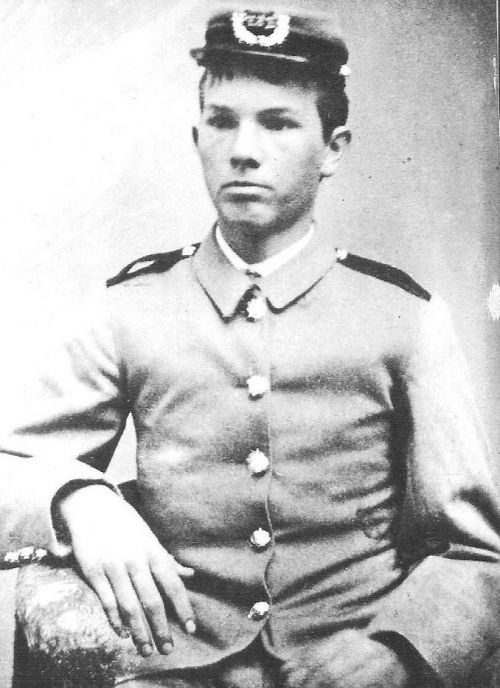IN TRIBUTE TO A TRUE SOLDIER
By Ex-Sheriff Andrews, of Orange County, N.C.
On May the tenth, nineteen hundred and twenty-six, Robert Nelson Hall, a prominent citizen and prosperous farmer of Orange County, died suddenly in Danville, Virginia, where he had gone to attend a meeting of the Tobacco Growers Co-Operative Association.
His body was brought back to his home near Caldwell, and on the twelfth was buried at Berry’s Grove Baptist Church, of which he and his wife were founders. A vast concourse of people followed his body to its final resting place, and a throng had gathered at the church to pay their last tribute to one who has lived so long and so nobly.
The third son of Nelson Parrish and Nancy B. Hall, the great grandson of William Deal and and John Hall of Revolutionary service, he was born January 15, 1846, in Orange County, North Carolina, and his entire life was spent on his native soil. At the age of seventeen, while attending a private school, he volunteered his services and entered the ranks of the Southern Confederacy. He joined Company K, Second North Carolina Cavalry, General Barringer’s Brigade, William Henry Lee’s Division, Wade Hampton’s Corps, and served successively under Captains Joe Turner, William Graham and John P. Lockhart, till Johnson’s surrender near Durham.
His war record, like his entire life, was marked by bravery, courage, faithfulness to every trust, and a high regard for duty. This experience in his early life developed hardihood, endurance, sacrifice and a willingness to stand for right at any cost. Inspired by the matchless spirit of his great chief, Robert E. Lee, he absorbed many of his lofty ideals.
At the close of the war, like many sons of the lost cause, he turned his thoughts to rebuilding the impoverished and bleeding South. There followed years of struggle, hardships and privations, but all these he met with dauntless spirit and a song of hope.
On March 25, 1869, he was married to Mary Ann Villines, grand-daughter of Elder Stephen Pleasants, founder of the Beulah Association. This faithful helpmate journeyed with him to the end. Her devout Christian character, her industry and her culture aided him in rearing a family of useful children and in establishing a home where the traveler was wont to rest, the weary and sore distressed to find comfort and the friendly guest to while away a pleasant hour. To such wives and mothers, to such homes, our progressive and prosperous Southland today owes a passing tribute.
After this marriage, surrounded by his father’s faithful and devoted old slaves – now tenants – he engaged whole-heartedly in farming. Like Jefferson and our earlier settlers, agriculture to him was the greatest of all occupations. Planting and reaping were to him wonderful seasons. He loved the great outdoors. God spoke to him in the sunshine and the rain, in the field and forest, bird and flower. His toil was ever enriched by sweet communion and a beautiful idealism. In his plans for keeping and developing his farms he was an artist. A life of usefulness and a Christian home were his goal, not wealth.
To him the Bible was God’s Inspired message to mankind. He accepted its teachings, believed its truths, and departed life triumphantly resting on its promises. It had been his stay and support in the thick of the fight and in the hour of trial. He considered man’s chief end is to glorify God. The greatest concern of his life was to see Christians true to their profession and loyal to their obligations.
Along with his devotion to the cause of Christianity was his interest in education. For more than thirty years he was chairman of the Board of Trustees of Caldwell Institute, and old Academy type of school. Along with his interest in the educational affairs of his county, as a member of the State legislature in 1890-92, he fought for the establishment of a school for the higher education of women, and it was this legislature which voted to establish the North Carolina College for Women at Greensboro.
Always he wanted to see Christianity and education expressed in citizenship. Every interest for the betterment of society had his strong support. No consideration ever weakened his stand for right. This dominant characteristic of his life carried him at the age of eighty-one to Danville, Virginia to fight for a cause which seemed to him at present a losing game – the idea of co-operative marketing for farmers.
As often as he wished it might be, he was called in the midst of effort and activity – suddenly – without warning – but the Master found him not unready nor unwilling to go.
A faithful soldier is at rest, a gentleman of the old order has passed out. Among the many tributes paid him, nothing finer has been said when a prominent local physician, and intimate friend remarked, ” When men wanted to know the right side of a question they always looked to see where Nelson Hall stood. ”
(Posted By request and with permission of William Forlines)

Leave a Reply